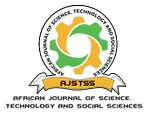The importance of vocational training in horticulture
DOI:
https://doi.org/10.58506/ajstss.v1i1.21Abstract
Horticulture is one the fastest growing sub-sectors in Kenya and contributes significantly to the agriculture sector, mainly through export but increasingly supplying the domestic market. The Enhancing Partnerships for Industry-led Vocational Training and education for water smart & climate proof horticulture (ePivot) project aims to improve professional education and vocational training at of Polytechnics and Technical and Vocational Colleges (TVCs) in the horticulture value chains through strong collaboration with the private sector.
The horticulture sector is expected to contribute towards the envisioned poverty reduction, and overall food security, as such contributing to SDG 2 while the need for water and climate smart technologies is high. The sector is generally a labour-intensive industry with high demand of skilled workers, trained supervisors and professional managers. Over six million Kenyans are directly and indirectly employed in horticulture, women constitute 75% of the labour force in the horticulture industry. The increase in horticulture is fuelled by rapid population growth and urbanization, an increasing middle class that is health conscious and consumes more fruits and vegetables but demands the produce to be of good quality and safe to consume. Horticulture offers opportunities for economic growth and employment both in production but increasingly so in value addition. This calls for a specified and educated pool of labour is high.
The current TVCs and associated education institutions have a very general focus and there is lack of specialized workforce in horticulture. The ePivot project aims to close those gaps, strengthening the capacity of the TVCs through a strong collaboration between the education institutes and the private sector, strengthening linkages among the various actors to enable practical learning and innovation in the horticulture sector and making it water and climate smart. The consortium consisting out of 6 TVCs working together with Meru University of Science and Technology and supported by industry partners as well as 4 universities in the Netherlands, focuses on making the horticulture curriculum more competence based. Initial results are encouraging, both tutors and students are appreciating the practical approach to skills development.


